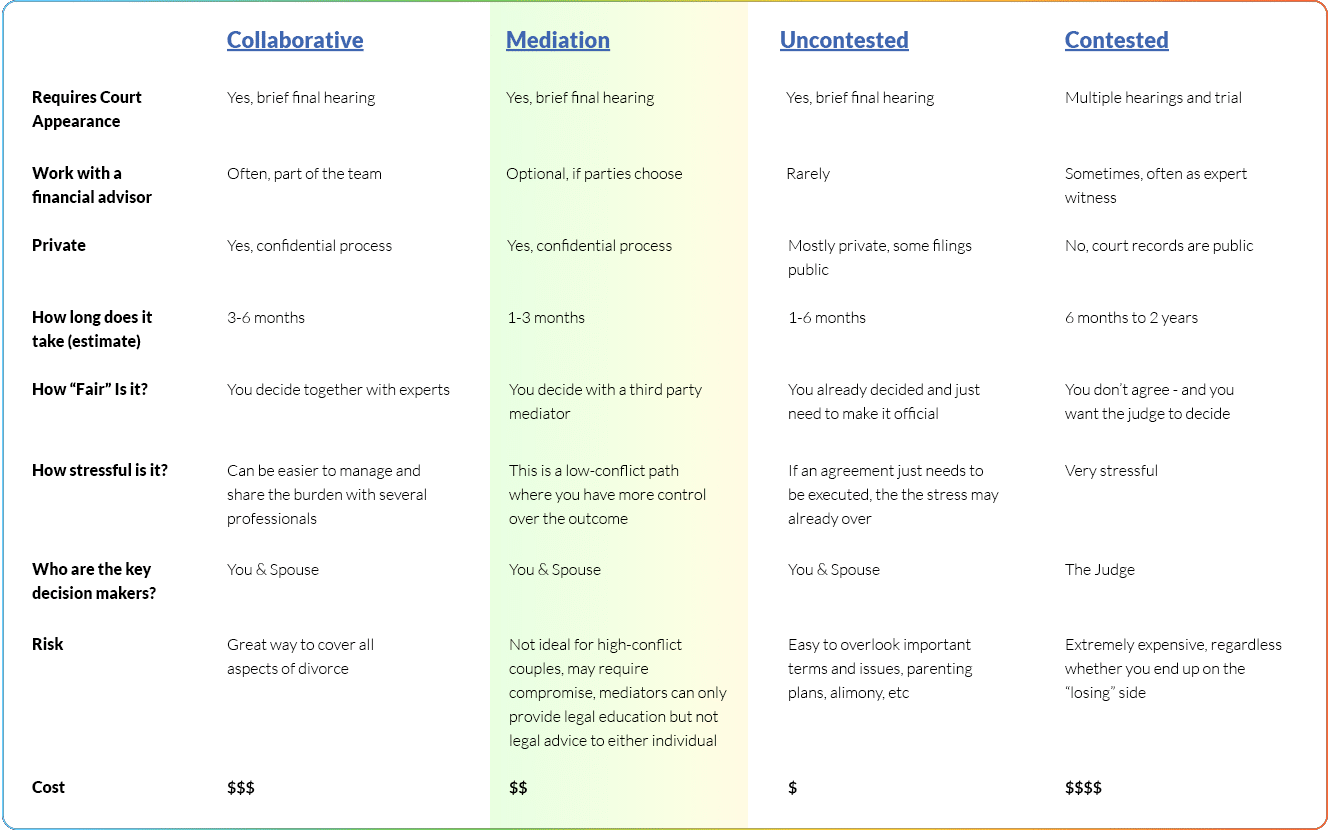Why Choose Mediation? Benefits & Limitations of Divorce Mediation
Mediation works best for couples who are ready to approach their divorce with cooperation and focus on the bigger picture. It’s especially effective for:
- couples with few assets or minimal issues to resolve,
- those who have already had productive discussions about divorce terms,
- or individuals motivated to resolve matters quickly and efficiently.
For example, this may be a great option for:
- a young couple who, after three years of marriage, realize they’re better off as friends,
- spouses navigating a peaceful separation after one partner comes out,
- or for empty nesters who stayed together for the children but are now ready to move forward.
Mediation allows you to stay in control of the process, save time and money, and keep personal matters private.
That said, mediation is not for everyone. If either spouse is focused on revenge, “winning,” or manipulating the other, the process is unlikely to succeed. Mediation depends on both parties negotiating in good faith, which means it’s not ideal in situations involving high conflict, abuse, or an unwillingness to share information. If you enter mediation hoping to punish your spouse, you’ll only prolong the process and increase costs.
In short, mediation is a powerful tool when both parties are ready to work together, but the wrong choice if the primary goal is to “beat” the other person.
Advantages Over Litigation
Mediation offers a more practical, cost-effective, and respectful way to navigate divorce compared to the courtroom process. Instead of being locked into a rigid legal battle, you work together to create solutions that fit your life and your family’s needs. Key advantages include:
- Faster resolution — most cases settle in a few sessions instead of dragging on for months or years.
- Lower cost — fewer billable hours and no drawn-out court battles mean significant savings.
- Less emotional strain — flexible scheduling and a cooperative environment reduce stress for everyone involved.
- Privacy protection — sensitive financial and personal details remain confidential, not part of the public record.
- Control over the outcome — you and your spouse make the decisions, not a judge unfamiliar with your family.
- More lasting solutions — agreements you create together are more likely to be honored and require fewer future disputes.
When Court May Be Necessary
Sometimes, litigation is the only way to move forward. You may need to go to court if:
- One spouse won’t participate in good faith, hides financial information, or refuses to cooperate.
- There is domestic violence, abuse, or a major imbalance of power, making mediation unsafe or unfair.
- The issues are too complex or contested, such as high-value assets, business ownership, or major custody disputes.
In these cases, courts can provide legal protections, enforce information sharing, and ensure decisions are fair and enforceable when cooperation isn’t possible.
How Mediation Works in Florida
- how you want the divorce to move forward,
- how to divide assets,
- and if you have children, how to create a parenting plan that works for everyone.

What is “The Artemis Family Law” Approach to Mediation?
Divorce doesn’t have to be a battle. Attorneys Teris Deitsch and Paul Shafranski have built their careers on helping couples separate with dignity, respect, and clarity. Paul is one of fewer than 50 professionals in Florida recognized as an Accredited Collaborative Professional. Together, they bring years of experience guiding clients through mediation with a steady hand and a calm, solutions-focused approach.
We don’t just mediate—we guide you through the process and help you avoid costly mistakes. We make sure you understand your rights, explore options, and turn agreements into solid legal documents. With Artemis, you get it right the first time, saving stress, time, and money while protecting your peace of mind.
Schedule Your Mediation Consultation
Take the first step toward a calmer, more cost-effective divorce. In your consultation, we’ll explain how mediation works, answer your questions, and help you decide if it’s the right path for you. Schedule today and move forward with clarity and confidence.
Mediation Frequently Asked Questions

Do I still need a lawyer?
A lawyer is not required for a couple to engage in mediation and settle their divorce. However, because the mediator cannot provide legal advice to either spouse, sometimes it is helpful for a spouse to consult with a lawyer before finalizing any agreement through the mediation process.

What if the other party doesn't cooperate?
If the other spouse does not cooperate with mediation, then there is not much that can be done through the mediation process. At that point, the only option for addressing an uncooperative spouse is to engage in the litigation process.

Can we switch paths later?
Typically, it is easier to start out attempting a peaceful resolution and switching to a litigation-centered path later if it becomes necessary, than to start out in a litigation divorce and then try to resolve things amicably. How a divorce process starts is often the best predictor of how the divorce will proceed and resolve. In other words, a respectful and peaceful start to the divorce will often lead to a respectful and peaceful resolution, while a contentious start will usually lead to a contentious process.

How Much Does Mediation Cost?
Our mediation pricing is simple and transparent. For Pro Se Mediation (where neither spouse has an attorney), the cost is $500 per two-hour session, and most motivated couples finish in just three to five sessions. We charge a one-time $1,000 drafting fee for both the Marital Settlement Agreement and Parenting Plan, or $750 if you only need the Marital Settlement Agreement. If you’d like us to prepare the additional legal documents required for your divorce, there’s an optional $500 flat fee—or you can handle them yourself through the court’s self-help center. For Attorney Mediation, please contact us directly for pricing.

